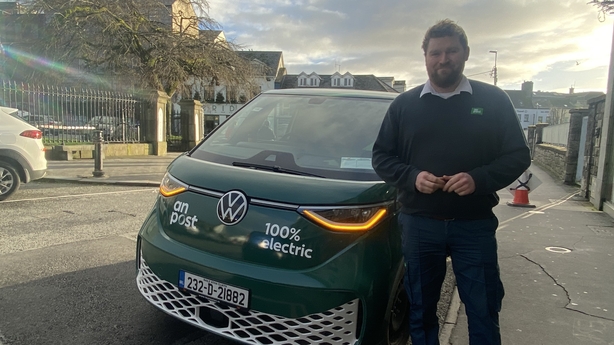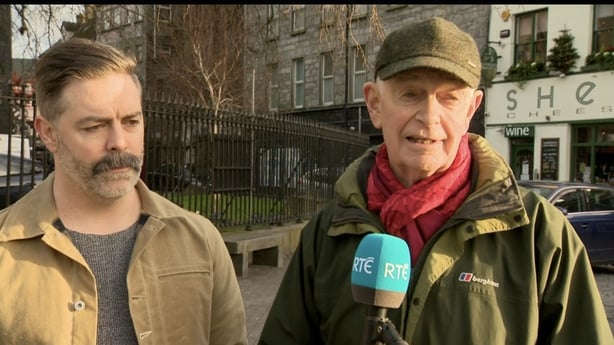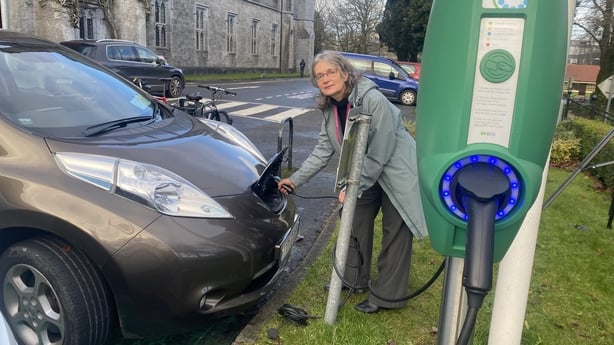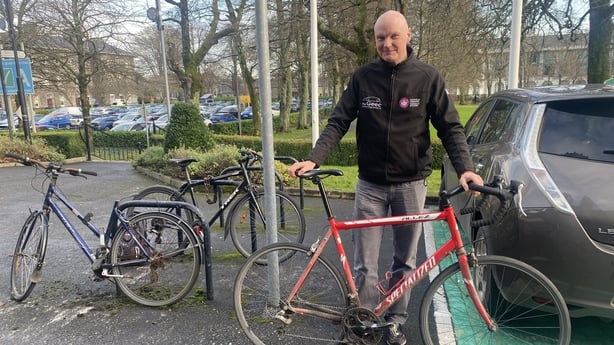Ireland is committed to reducing dependence on fossil fuels to help achieve a 51% cut in carbon emissions by the end of the decade.
One of the main contributors to carbon emissions is transport, and a shift away from petrol and diesel cars to electric vehicles will greatly reduce those emissions.
The number of electric cars on Irish roads almost doubled to 10,000 in the first quarter of this year - but the shortage of charging points and the cost of buying them remain deterrents
Just arrived in Galway, top of the range An Post electric vehicles with charging points at local depots.
Ciaran Burke is a manager with An Post and says most of the fleet has been fully electric for years but these new vehicles have a broader range and more space.
"These vehicles are the way of the future. I know grants have been reduced but as technology improves the price will go down as well.

"In general I think electricity is cheaper than using the likes of diesel.
"So there's a big outlay at the beginning but it definitely pays off over the lifetime of the vehicle.
"If the Government are really serious about going carbon neutral they'll move to make EVs more affordable for everyone. We can't keep using diesel and petrol."
But for many electric cars are still too costly for many. Aoife Cheung drives a diesel car but would love to switch
"We've shopped around to look for an electric car but they're too expensive at the minute.

"Maybe if the Government decided to give us a better grant or something, it would give us more of an initiative but right now I have to drive a diesel car."
Sean and Rowan Hughes are father and son and care about sustainable living.
"I drive a diesel car right now but want to make the switch like my father.
"It's cost really. EVs are more or less new so there isn't a second-hand market.
"A car is a major buy after a house so I think the more the Government can do to drive those costs down with subsidies would really help me make the change."

Rowan's father Sean is very happy with his EV but said he "pushed the boat out" at the time to buy it.
"I would like to see more accessibility for the man on the street to purchase an electric car because they are expensive.
"And we also have to think about the infrastructure and whether there are enough charging points. That will also have to improve but I'm sure it will."
The average cost of an electric car is around €30,000 and sales are expected to be up for January 2024.
But the Government's target to have almost a million on our roads by the end of the decade falls far short.
Gary Brown is a salesman at Windsor Motors.
"We have a lot of interest in electric cars and they are so much cheaper to run after the initial investment.
"But the Government grant has been reduced from €5,000 to €3,500 and we would like to see that decision reversed."
Dr Linda Howard is a lecturer in cell biology at the University of Galway. She bought her electric car seven years ago and said that it suits her daily commute from Conamara.
"We needed a new car at the time and the cost of replacing the old one was too expensive.
"So we did the maths and worked out that if we got a new electric car and it lasted for eight years, it was cheaper than buying a used petrol car with the assumption that that would last eight years as well.
"So we jumped in and made the switch. Day to day it's brilliant because we have a 20km commute each way. We can charge at home. There's lots of chargers here at the university so we can charge at work as well."
Dr Howard says she is not inclined to do long journeys because the range is limited, but said newer EVs have a much better range.

She also thinks more chargers are needed to accommodate increased numbers of people driving them.
"There are certainly parts of the country where there just aren't enough chargers. There needs to be more in Conamara to attract people to drive out for tourism and things.
"From an environmental and driving point of view EVs are lovely to drive and much more efficient than a petrol car."
Research by the Northern and Western Regional Assembly found that outside of cities like Dublin and Cork, there was a serious shortage of public charging points.
John Daly is Economist with the Northern and Western Regional Assembly:
"The roll out of publicly available EV charge points needs to be dramatically improved across Ireland if the government is to deliver one million EVs on Irish roads by 2030, particularly in rural regions such as the Northern and Western Region.
"Our research has found that the lack of publicly available EV charge points is one of the key factors discouraging people from the Northern and Western region in switching to EVs, with this type of infrastructure central to overcoming challenges such as 'range anxiety', namely an EV driver’s fear that they will run out of power before reaching their destination.
"Policymakers may also consider enhancing EV grants as the high price of EVs was seen as the greatest barrier to purchasing an EV, while the provision of regionally targeted grants could improve the uptake of EVs in rural regions with low levels of disposable income."
As well as more electric cars, there were calls today on the Government and local authorities to improve the public transportation network along with walking paths and cycleways.

Professor Rory Monaghan lectures in the School of Engineering at the University of Galway and says there are positive changes afoot.
"Here in the university we have a park and ride service where people can park far away from the campus.
"We have electric buses that bring people to their place of work. So it's small interventions like this. That is going to get us over the line eventually."
He also cited the new Galway to Clifden City Link service as an example of an improved public transport service.
"For people like me living in Moycullen, it means that there's a bus more or less every hour. That was something that was unthinkable even a few months ago.
"So change is happening. It's just maybe not at the pace that we would have wished."
"I own an electric car myself and it's a fantastic machine.
"But we don't need them to replace every car.
"An electric car still takes up the same space on a road as a petrol car does. So it's not going to solve congestion.
"It will solve some of our problems, but we need to think holistically and we need to really focus on delivery in Ireland."






